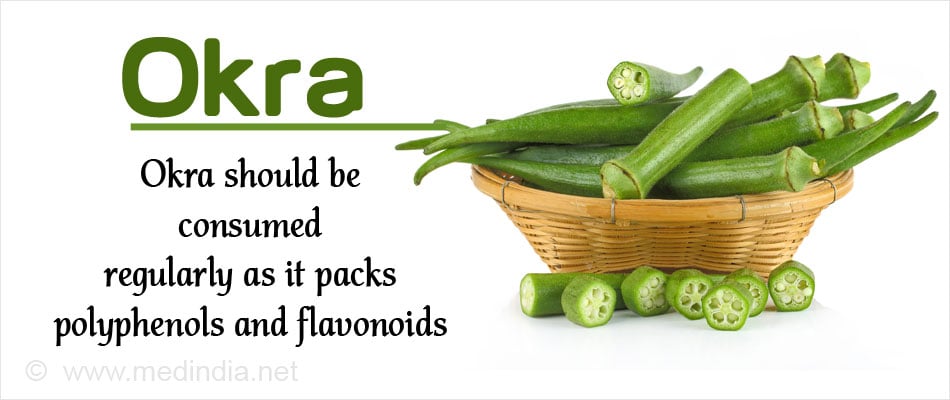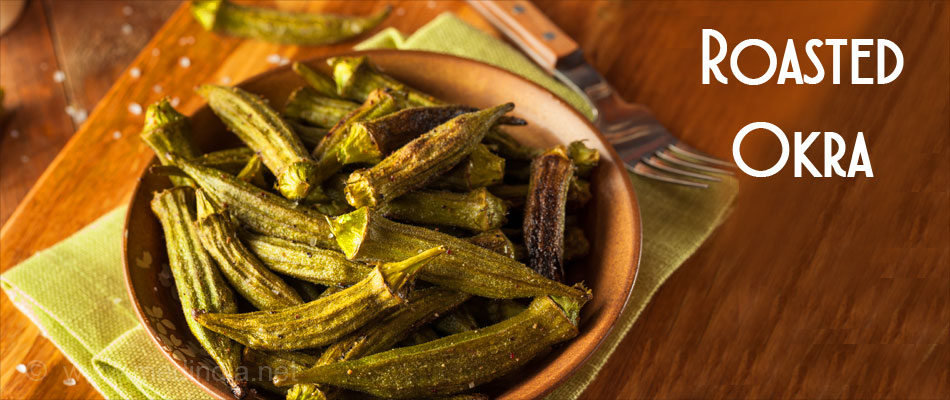- Antidiabetic and antihyperlipidemic potential of Abelmoschus esculentus (L.) Moench. in streptozotocin-induced diabetic rats - (https://www.ncbi.nlm.nih.gov/pmc/articles/pmc3178946/)
- Antioxidant and Anti-Fatigue Constituents of Okra - (https://www.ncbi.nlm.nih.gov/pmc/articles/pmc4632455/)
- ‘Okra’ Hibiscus esculentus L.: A study of its hepatoprotective activity - (https://www.ncbi.nlm.nih.gov/pmc/articles/pmc3745186/)
- The Effect of Abelmoschus Esculentus on Blood Levels of Glucose in Diabetes Mellitus. - (https://www.ncbi.nlm.nih.gov/pubmed/27516694)
- Making the Case for Okra: The Multitasking Southern Staple - (http://www.foodandnutrition.org/stone-soup/september-2014/making-the-case-for-okra-the-multitasking-southern-staple/)
- The okra skin extract and its cholesterol-lowering activities — in vitro study (1045.28) - (http://www.fasebj.org/content/28/1_supplement/1045.28)
What is Okra?
Okra or lady’s finger, bhindi or gumbo belongs to the mallow family just like hibiscus, cocoa, and cotton. Okra is scientifically known as Abelmoschus esculentus and has hibiscus-like flowers and green seed pods. The plant is cultivated in warm temperate, tropical and subtropical regions around the world.
Raw okra is 90% water and contains fiber, vitamin K, vitamin C, thiamin, folate, vitamin B6, beta carotene and Lutein. Okra is not one of the much liked vegetables across the world but some of the revealing okra health benefits will surely make it a regular part of any cuisine.

Lowers Blood Sugar
Traditionally okra is known to lower blood sugar levels in patients with diabetes. Clinical studies endorse the positive role of okra in regulating blood sugar levels in diabetics.
A murile study by V. Sabitha and colleagues published in Journal of Pharma Bioallied Sciences in 2011, support the antidiabetic and antihyperlipidemic potential of Abelmoschus esculentus peel and seed powder in rats with diabetes.
Fan S and colleagues assayed the effects of an ethanol extract of okra (EO) along with its main flavonoids - quercetin 3-O-gentiobioside and isoquercitrin on metabolic disorders in high-fat diet-induced obese mice. EO with its flavonoids reduced blood glucose, serum insulin levels and inhibited the expression of nuclear receptor transcription factor PPARγ, which regulates lipid and glucose homeostasis. The study published in Journal of Nutritional Biochemistry in 2014 concluded that okra is highly recommended as a dietary therapy for hyperglycemia and hypertriglyceridemia. Okra water can be consumed before meals or in the morning on an empty stomach. Alternatively okra peel and seed powder made at home or in capsule form can be consumed.
Okra Water Preparation
- Chop the ends of 6-8 okra. It can be slit vertically into half or the okra can be pricked by fork.
- Steep the slit or pricked okra, overnight, in a glass of warm water
- In the morning, remove the okras and consume the water.
Health Benefits of Okra
Anti-Fatigue Effects of Okra Seeds
According to a study by Fangbo Xia and his colleagues, it was seen that total flavonoids, isoquercitrin and quercetin-3-O-gentiobiose were found only in okra seeds as compared to the okra skin. Okra skin had more total polysaccharides compared to okra seeds, however the seeeds contained more total polyphenols. The polyphenols and flavonoids bestowed okra seeds its anti fatigue and antioxidant effects. Okra seeds reduce the levels of blood lactic acid (BLA), urea nitrogen (BUN) and it enhances hepatic glycogen storage. Okra seeds lower malondialdehyde (MDA) levels, which is a marker of oxidative stress and increases superoxide dismutase (SOD) and glutathione peroxidase (GSH-PX) levels, thereby exhibiting antioxidant qualities. Okra seeds help to reduce fatigue and tiredness.

Antioxidant Effect
Okra has liver-protective and antioxidant effects because of its active phyto-constituents like flavonoids and polyphenols. Antioxidants help reduce oxidative stress that can damage body cells and lead to Alzheimer's disease, Parkinson's disease, cataracts and macular degeneration. Vitamin C helps to create more white blood cells which in turn boosts the immune system and fights free radicals.
Lowers Cholesterol
Okra is rich in dietary fiber and its mucilage binds with cholesterol and bile acid carrying toxins that are filtered out by the liver. Okra prevents absorption of cholesterol in the intestines. Study by Kittana Mäkynen and colleagues highlights cholesterol-lowering activities of okra skin extract. The okra skin extract could bind to bile acids glycodeoxycholic acid, taurodeoxycholic acid and taurocholic acid. The okra skin extract exhibited cholesterol-lowering activities by binding with bile acids; inhibiting pancreatic cholesterol esterase activity and reducing the effectiveness of cholesterol micellization.
Supports Healthy Pregnancy
Pregnant women are recommended to consume folic acid that produces and maintains new cells. Folate, Vitamin C, Vitamin B, leutin prevent miscarriage, birth defects and promotes healthy growth of the fetus. Okra is rich in all of these nutrients that are essential during pregnancy.

Prevents Osteoporosis
Vitamin K plays an important role in calcium absorption by the bones. The recommended level of Vitamin K by USDA for adults is 90 mcg/day. There is 4.25 mcg of Vitamin K in 3inch long okra (cooked, boiled, drained, with salt). A cup of cooked okra can contain 66% to 80% daily value (DV) of vitamin K. Okra also provides 7% DV of calcium.
Anti-Cancer Properties
Leonardo G. Monte and colleagues showed that lectin extracted from okra, promotes selective antitumor effects in human breast cancer cells. It induced significant cell growth inhibition (63 %) in breast cancer cells as the expression of genes which initiates cell death, increased. Flow cytometry indicated that okra killed 72% of breast cancer cells through apoptosis.
Combats Constipation
Okra’s mucilage soothes the intestinal tract unlike wheat bran that can irritate the intestinal lining. Its mucilage and fiber help to gently get rid of constipation. Okra improves digestion and prevents bloating
Vision Protection
Okra contains vitamin A, beta-carotene, lutein and zeaxanthin and antioxidants that are good for the eyes. Vitamin A protects the eye surface that is the cornea. Lutein and zeaxanthin protect the eyes from blue light and guards against free radicals. Regular consumption of okra can prevent or delay macular degeneration and cataracts.

Heals Stomach Ulcers
Okra is slightly alkaline therefore it assists in healing the stomach ulcers by balancing the gastro acids. Okra helps to protect the digestive tract.
Healthy Skin & Hair
Loaded with Vitamin C, Vitamin K, antioxidants and mucilage, regular consumption of okra promotes healthy skin and hair growth. Okra water made by steeping okra pods in boiling water serves as hair conditioner and it can be added to various face packs to reduce dryness and blemishes on the face and skin. Mucilage helps to keep the digestion healthy and vitamin C plays an important role in collagen formation. Okra has 16% DV of vitamin C.
Treats Leukorrhea (Vaginal Discharge)
Okra helps to remove mucous from your system because of its mucilaginous nature. It reduces vaginal discharge. Okra pieces can be boiled in water till the water is reduced to half. The residual water can be consumed to alleviate leucorrhea.
Okra has positive effects in diabetic nephropathy and can alleviate asthma symptoms. However, it is rich in oxalates which may be a risk factor for kidney stones. Okra is nutrient dense, fiber rich, low GI vegetable but is abhorred world over, for its slimy texture. There are interesting ways to incorporate okra in one’s cuisine.
- Pickled okra
- Roasted okra as appetizer or added to salads
- Okra vegetable sides
- Fried okra (occasionally)
Easy Roasted Okra Recipe
Ingredients:
- 100-200 gm of Okra pods (washed)
- 2-3 tablespoon extra virgin olive oil
- Rock salt, Pepper, thyme or rosemary to taste
Process:
- Preheat oven to 400°F.
- Remove the okra ends and slit okra into vertical half.
- Pour oil and add condiments into a bowl
- Toss slit okra into the oil.
- Roast the okra in the oven for about 10-15 minutes till they are cooked and crispy.
- Serve as an appetizer with yogurt dips.
- Roasted okra can be added to salads and sprouts with beans, potato or lean meat. It can be consumed to satisfy mid meal hunger.









